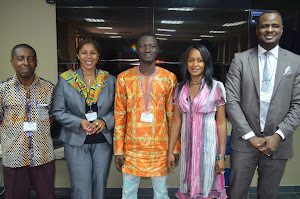By Edmund Smith-Asante
 |
| Vital Signs was launched in Africa in 2012 |
A method to monitor agriculture,
nature and human well-being to ensure food security, known as the Vital Signs
Monitoring System, has been introduced in the country.
Vital Signs was launched in Africa
in 2012 with a grant from the Bill & Melinda Gates Foundation to
Conservation International, which is spearheading the monitoring system in
partnership with the Earth Institute at the Columbia University and the Council
for Scientific and Industrial Research in South Africa.
The introduction of the monitoring
system is to meet the urgent need for better data and risk management tools
that can guide decisions about agricultural development and ensure that the
development protects people and nature.
Vital Signs provides near real-time
data and diagnostic tools to leaders around the world to help inform
agricultural decisions and monitor their outcomes and it is expected to create
a platform for policy-makers during policy planning.
According to the CSIR, the system is
already operating in Ghana, Tanzania, Kenya and Rwanda, and it is aimed at
identifying productive zones to boost agricultural production in the four
countries.
The system will also offer viable
data on the production areas and for specific crop yields in the country and is
expected to become a public document that would be used to assess the viability
and conduciveness of a variety of crops for certain climates and times.
Importance
of system
The value of the system was brought
to the fore at a stakeholders’ workshop convened by the CSIR, WRI and Vital
Signals in Accra.
Introducing the system at the
workshop, the Africa Fields Director of Vital Signs, Mr Patrick Mutuo, said the
implementation of the system was to generate data for planners and farmers to
allow better decision-making in support of development.
He said even though there were more
mouths to feed, people continued to degrade the environment and water bodies
every minute.
Mr Mutuo said although there were
about 239 million mouths to be fed in Africa, degradation and other bad human
practices continued to compound the problem over the years.
He explained that the system was a
capacity building programme which had been on the ground for the past two
years, adding that it was doing well in Tanzania and its neighbouring countries
and offering farmers the opportunity to improve on their farm yields.
Mr Mutuo said the system also
afforded the local farmers the opportunity to interact and know where some
yields could be planted, and that the system could support specific
agricultural and environmental policies in the country.
He added that the system would offer
a preliminary user interface and data visualisations across the country for
improved agriculture.
Irresponsible
behaviour
The Deputy Director-General of
the CSIR, Dr Rose Emma Mamaa Entsua-Mensah, who was the chairperson for the
workshop, said the irresponsible behaviour of some people on the environment
was affecting agricultural production.
She stated that some practices in
the country were destroying water bodies, which called for environmentally
sustainable measures to arrest the situation.
“Some Ghanaians are being irresponsible
and very soon there will be no water to irrigate the crops in the country,” she
said.
Dr Entsua-Mensah called for a
forecast like the Vital Signals, to better manage the poverty alleviation
programmes that have been implemented over the years.
However, she said that could only be
done by using better risk management technologies such as the Vital Signal
system.
This
story was first published by the Daily
Graphic on September 14, 2015





No comments:
Post a Comment